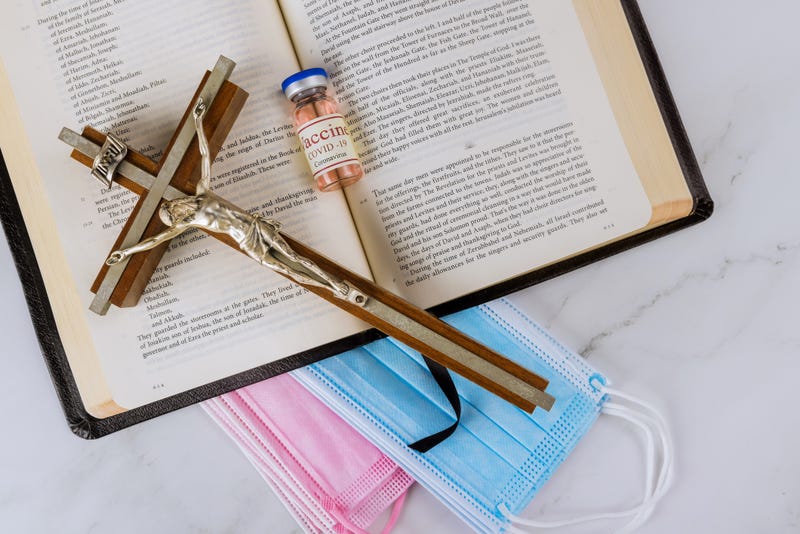
Religious freedom is one held close by many across the United States. But some health experts are expressing concern that faith-based objections to COVID-19 vaccines will undercut mandates that are being issued by an increasing number of workplaces, schools and local governments.
Dr. Anthony Fauci, the nation's leading infectious disease expert, previously said he expects a flood of mandates at businesses and schools as soon as the Food and Drug Administration issues a full approval for a COVID-19 vaccine -- which could happen by the end of August. Fauci added that the federal government will not mandate vaccinations for the country, though it is encouraging state and local governments to consider such mandates to keep communities safe.
Listen to your favorite News/Talk station now on Audacy
Under Title VII of the Civil Rights Act of 1964, individuals can object to vaccines due to their religious beliefs. The law's definition of religion is extremely broad and extends to moral beliefs.
As the number of mandates grow, the number of people seeking religious exemptions -- legitimate or otherwise -- is also rising.
One pastor in Rocklin, California said he's been inundated with requests from people looking to skirt vaccine mandates, so he's giving written notes for religious exemptions to anyone who asks. Pastor Greg Fairrington, in a social media post, said he is not anti-vaccine, but believes "there is religious precedence for giving people the right to choose who feel morally compromised."
In Louisiana, Attorney General Jeff Landry created a form for residents with religious objections to the vaccine to declare their intentions. It states, in part, "I object on religious grounds to forcing my child to participate in any medical experiment," and "I do not consent to forcing a face covering on my child, who is created in the image of God."
The Catholic bishops of Colorado also drafted a letter template for those who have come to an "informed judgment" that he or she should not receive a vaccine. The bishops added that use of some COVID-19 vaccines is morally acceptable under certain circumstances but that "some individuals have well-founded convictions that lead them to discern they should not get vaccinated," and those personal choices should be respected.
"Vaccination is not a universal obligation and a person must obey his or her own conscience,” the bishops said.
Meantime, in San Diego, Bishop Robert McElroy sent a letter to priests asking them to "caringly decline" requests from those seeking a religious exemption to justify their decision to be unvaccinated, saying there is no basis in Catholic teaching to do so.
Health officials are concerned that the increasing number of religious exemptions could undermine vaccine mandates put in place by local governments and workplaces. History has shown that religious exemptions have contributed to outbreaks in preventable diseases in the past, such as the 2019 outbreak of measles among Orthodox Jewish communities across the U.S.
From January 1 to December 31, 2019, 1,282 individual cases of measles were confirmed in 31 states, according to the Centers for Disease Control and Prevention. It was the greatest number of cases reported in the U.S. since 1992. The outbreak is believed to have started when unvaccinated travelers arrived in the U.S. from Israel, which was experiencing an outbreak of the disease. The CDC said 86% of cases were connected to close-knit communities with pockets of unvaccinated people. Children in orthodox communities have lower rates of routine vaccination coverage, the CDC reported. For measles vaccine, first dose coverage is 78.4%, compared with 90.1% among children in all other communities. Rabbis and other community leaders made a robust response to push immunizations, which health officials say was effective in controlling the outbreak.
Health experts believe legitimate religious exemptions should be honored. But there's always a flicker of doubt that some people may try to take advantage of the system and claim a religious exemption when it's their personal or political belief driving vaccination avoidance. Dorit Rubinstein Reiss, a professor at University of California Hastings College of Law, said people will lie about their religious views to mask their general safety concerns about the vaccine.
"People who are scared of vaccines often have very strong feelings on the topic, and often feel they're justified in lying," Reiss told USA Today. "So it's very vulnerable to abuse."
No major religion officially opposes vaccinations, leaving the decision instead up to members. Many religious leaders, like the pope and Dalai Lama, have been vaccinated and made efforts to promote the vaccine. The Church of Jesus Christ of Latter-day Saints also updated its official policies to encourage vaccinations.
Two common religious reasons the faithful turn down vaccines, according to a report in the East Idaho News, include ingredients -- the vaccine cannot contain animal-based ingredients such as gelatin, and fetal cell lines -- the vaccine cannot contain cells derived from aborted fetal tissue.
None of the three approved COVID vaccines contain animal products or aborted fetal cells. Here is where the Johnson and Johnson vaccine falls into a bit of gray territory, though, as the vaccine used lab-replicated fetal cells during its development. However, the J&J vaccine currently being administered does not contain any fetal cells.
While major religions encourage their members to get vaccinated -- some even stating it is a member's religious obligation to take care of their bodies -- others operate under the belief of God's will. Whether a person gets sick and dies or survives is God's will and should not be interfered with.
Just over 72% of US adults have received at least one dose of the COVID-19 vaccine and 61.8% are fully vaccinated, according to the latest data from the CDC.



